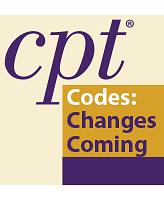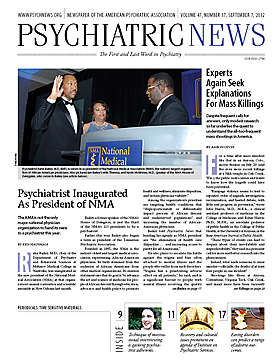It’s not glamorous work, but someone has to do it.
And APA members can be grateful that Ron Burd, M.D., a former speaker of the APA Assembly, has turned an interest in medical coding and reimbursement issues into something of a second calling. As chair of APA’s Committee on RBRVS, Codes, and Reimbursements, and as an APA representative to the AMA’s RBRVS Update Committee (RUC), Burd has helped educate psychiatrists about the importance of accurate coding and worked hard to make sure that psychiatrists are fairly reimbursed for the work they do.
Along with other APA representatives to the RUC, he has been instrumental in major reforms due to go into effect in January 2013, including the deletion of many familiar codes, revision of some current ones, and the creation of new codes to more accurately reflect the way psychiatry is practiced today.
As a result of a five-year review of codes by the RUC, Burd says a new coding structure will be instituted that will include—like the evaluation and management (E&M) codes available to all physicians (99xxx series codes)—levels of complexity that will make it possible to better capture clinical work with psychiatric patients.
APA has been a leader in shaping and developing the codes that will describe the work of psychiatrists, advanced-practice nurses, psychologists, and social workers.
The changes are expected to be approved in the coming months by the federal Centers for Medicare and Medicaid Services (CMS); in coming issues, Psychiatric News will provide coverage of these changes, as well as other important aspects of CPT coding and reimbursement.
“I got into this area because I was interested in being as efficient as I could be in my own practice, so I turned to APA for information and advice about coding,” Burd told Psychiatric News. “I also felt a sense of responsibility to my profession, and people I respected were saying that this was an area where psychiatrists needed help.”
Unwise to Leave Coding to Others
Physicians are naturally focused on treating their patients and are sometimes happy to leave the matter of coding for their services to professional medical coders or administrative staff. But Burd says they do so at their financial—and possibly legal—peril.
“The problem is that the coders’ job is to make sure that doctors don’t overcode, so a lot of physicians’ work is poorly coded and undercoded,” he said. “On the other hand, creative coding is not a good idea. Physicians are responsible for the codes they submit, and if they are audited for fraudulent coding, it is the physician who will be held responsible, not the coding staff.”
In 2004 Burd was asked to join the APA Committee on RBRVS, Codes, and Reimbursements, and in 2006 he was named chair.
Created by the AMA in 1991, the RUC advises CMS about changes in the “relative value units” used in the formula—known as the Resource-Based Relative Value Scale (RBRVS)—for determining physician payment under Medicare. The 29-member committee—with representatives from the AMA and specialty organizations—offers recommendations about the relative value units that result in payment for every reimbursable code in the Current Procedural Terminology (CPT) Manual and helps to derive values for newly introduced procedures that receive codes.
And since private insurers may model their reimbursement on the federal program, the RUC’s work translates into dollars and cents for physicians everywhere. Think of it as organized medicine’s voice in a process for determining physician payment that might otherwise be more controlled by unfriendly forces. “The important thing about the RUC is that it is physicians trying to value our codes as opposed to bureaucrats,” said Burd.
“I Saw People Get Well…. It Was Fantastic”
Since his graduation from residency at the Mayo Clinic in 1986, Burd has worked as a staff psychiatrist with Sanford Health in Fargo, N.D. His mornings are spent in the partial hospital program, and his afternoons in the outpatient clinic.
Burd says he is working to expand telepsychiatry to improve access to care in rural areas around Fargo. He also consults with chemical-dependency clinicians, a local college, and other providers.
He grew up on a farm “in the middle of nowhere” in rural Montana and went to medical school at the University of Utah, originally determined to be a surgeon. But when he did his psychiatric rotation, his mentors told him he was good at it. “And I saw people get well, which was fantastic,” he recalled.
Burd’s work on the APA committee and on the RUC has entailed countless hours in meetings on the phone and in person in Washington, D.C., and Chicago. “My wife rolls her eyes whenever I mention the RUC,” he said.
But it is work that has reaped rewards for APA members and all of psychiatry. “Coding is vitally important for the individual practitioner,” Burd said. “The Board and leadership of APA have been very supportive of our work and understand that a huge part of keeping psychiatry viable as a specialty is making sure that doctors can make a living at it.”



